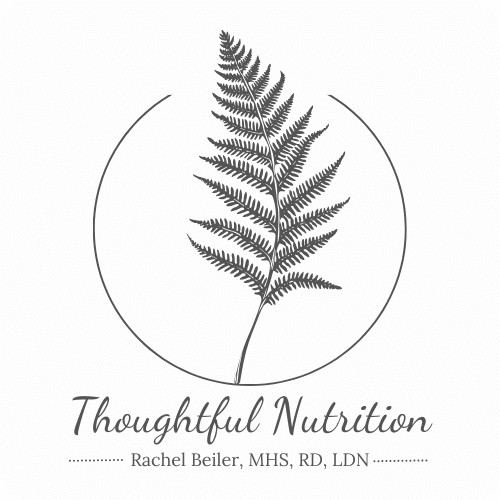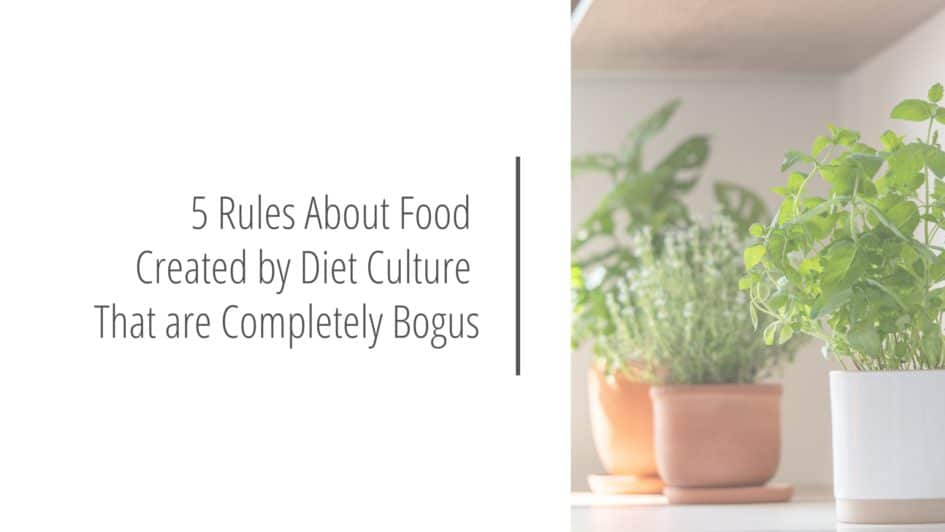Table of Contents
Food Rules Everywhere
Whether we realize it or not, we have all heard or read about them. Those rigid, guilt-inducing rules about food that seem to be everywhere. From social media influencers to friends and family, diet culture’s messaging is loud and clear: follow these rules if you want to be “healthy” or “good.”
But here’s the truth: most of these so-called rules are completely bogus. They’re rooted in fear, misinformation, and an obsession with control, and they can seriously harm your relationship with food.
The good news? You don’t have to follow them. Let’s break down 5 of the most common food rules diet culture created and why they’re total nonsense.
1. Don’t Eat After 7 PM
Where Did This Rule Come From?
The idea behind this rule is that eating late at night leads to weight gain because your body supposedly stores more fat when you eat closer to bedtime. But this is based on myth, not science.
Your body doesn’t have a built-in clock that suddenly decides to hoard calories after a certain hour. What really matters is your overall calorie intake and activity level over time, not the time of day you eat.
Why It’s Bogus
This rule completely ignores individual lifestyles and hunger cues. What are people supposed to do if they work late or have evening activities? Just go to bed hungry?
For many, eating after 7 PM is a necessity, not a choice. Shift workers, parents juggling busy schedules, or just someone who had a busy day shouldn’t have to feel guilty for listening to their bodies.
The problem isn’t when you eat, it’s letting an arbitrary rule dictate your hunger cues and create unnecessary guilt. There’s nothing wrong with eating after 7 pm.
2. Good Foods vs. Bad Foods
Why Do We Label Foods?
Diet culture loves a black-and-white narrative, and labeling foods as “good” or “bad” fits perfectly into that mindset. It simplifies complex nutrition into moral judgments, where eating a salad makes you “good” and enjoying a cookie makes you “bad.” But this narrative is not only false, it’s also harmful.
Why It’s Bogus
Labeling foods as good or bad creates a toxic mindset. It moralizes eating, making people feel guilty or ashamed for simply enjoying food. This guilt often leads to a cycle of restriction and binging. You avoid the “bad” food until your willpower runs out, leading to overindulgence and more guilt. It’s a vicious cycle.
The truth is, food doesn’t have moral value. A donut is not inherently “bad,” and a salad is not inherently “good.” They’re just different types of food that serve different purposes.
Health is about balance, variety, and moderation, not labeling food as right or wrong.
3. Earning Food Through Exercise
The Toxic Mindset of “Earning” Food
This rule is so deeply ingrained that most people don’t even question it. The idea is that you need to “earn” your food by burning off calories through exercise. This mindset is not only bogus but can also be harmful, as it equates movement with punishment and food with reward. This can quickly lead to the development of an unhealthy relationship with exercise.
Why It’s Bogus
Using exercise as a way to “earn” food creates a transactional relationship with eating. It turns physical activity into a punishment for eating and frames food as a reward for “good behavior.” This mindset can lead to disordered eating patterns, exercise obsession, and guilt around food.
The truth is, you don’t need to earn your food, ever. Food is not a privilege, it’s a necessity.
Exercise is meant to make you feel strong, energized, and joyful, not as a punishment for eating. A healthy relationship with food and movement is about nourishment and enjoyment, not guilt and restriction.
4. Eating 1200 Calories or Less
Where Did This Number Come From?
The 1200-calorie rule is rooted in outdated diet culture, and it’s dangerously low. Fun fact: 1200 calories is the recommended intake for a toddler, not a grown adult. Yet, this number keeps circulating as the magic solution for weight loss.
Why It’s Bogus
Eating this little is not only unsustainable but also harmful to your body. It can lead to fatigue, nutrient deficiencies, and a slowed metabolism. Extreme calorie restriction also increases the risk of disordered eating patterns and can trigger binging due to extreme hunger and deprivation.
Everyone’s body is unique, and energy needs vary greatly depending on age, activity level, and overall health. Listening to your body’s hunger and fullness cues is a far more sustainable and healthier way to eat than rigidly following a low-calorie diet.
5. No Processed Foods
The Fear of Processed Foods
Diet culture often casts processed foods in a negative light, implying they’re inherently unhealthy. But here’s the scoop: processed foods can absolutely be a part of a healthy diet.
The term “processed” simply means that food has been altered from its original form, whether it’s frozen, canned, or pre-packaged in some way. Just because something is processed doesn’t mean it’s bad for you.
Why It’s Bogus
The belief that processed foods should be avoided at all costs is misguided. Many processed foods, such as frozen vegetables, canned beans, low-sodium soups, or packaged nuts can be nutrient-dense and incredibly convenient. In fact, these foods can help make nutritious meals accessible, affordable, and easy to prepare.
Many processed foods are made with simple, wholesome ingredients, and some are fortified with essential nutrients like calcium or vitamin D. Instead of avoiding processed foods, consider how they fit into your overall diet. The key is to find a variety of options that nourish your body and suit your lifestyle.
Breaking Free from Bogus Rules About Food
Diet culture thrives on rigid rules and restrictions. But the good news is, you don’t have to follow any of these rules about food. Food isn’t meant to be feared or controlled. It’s meant to nourish you, bring you joy, and be a part of life’s experiences.
Breaking free from diet culture’s food rules isn’t just about rejecting them, it’s about unlearning years of ingrained beliefs. Diet culture thrives on control and guilt, but you can reclaim your relationship with food and your body. Here’s how:
Embrace Intuitive Eating
In short, Intuitive Eating is an approach to food and body image that focuses on listening to your body’s natural cues rather than following external rules or diets. It encourages you to honor your hunger, respect your fullness, and enjoy food without guilt or restriction. By reconnecting with your body’s signals, you learn to trust your own instincts around eating, rather than relying on rules like “good” or “bad” foods. Intuitive Eating is rooted in self-care, helping you build a healthier, more balanced relationship with food and your body.
If you’re curious about Intuitive Eating and want to learn more, you can read all about it on my site!
Practice Self-Compassion
Healing takes time, and it’s important to be kind to yourself when you slip back into old habits. Practice self-compassion and remind yourself that you’re worthy of enjoying food without guilt. It’s okay to make mistakes along the way, what matters is that you’re moving forward.
Redefine Health
Health is about feeling good in your body, not fitting into a specific mold. It’s mental, emotional, and physical well-being, not just weight or food restrictions. Focus on foods that nourish your body and bring you energy, and redefine what health means for you.
Take Back Your Power
Diet culture wants you to believe that following rules will make you healthier or more worthy, but you are the one who gets to decide what works for your body. Reclaim your power, trust yourself, and embrace food freedom on your terms.
Final Thoughts
These rules about food are nothing more than myths created by diet culture to keep you feeling guilty, restricted, and obsessed with food. Letting them go isn’t about giving up on health, it’s actually about finding a balanced, joyful way of eating that works for you.
Ready to ditch diet culture’s bogus food rules for good? Remember, there’s no one-size-fits-all when it comes to health, and you get to define what works best for you. Focus on listening to your body, practicing self-compassion, and building a healthy relationship with food that supports both your physical and mental well-being.
Thanks for reading!
Rachel Beiler, MHS, RD, LDN


Leave a Reply